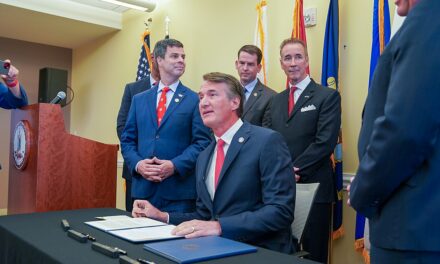We support our Publishers and Content Creators. You can view this story on their website by CLICKING HERE.
Former President Donald Trump said he is considering South Dakota Republican Gov. Kristi Noem as his vice presidential nominee for 2024.
“Kristi Noem has been incredible fighting for me,” Trump said on Fox News last month. “She said, ‘I’d never run against him because I can’t beat him.’ That was a very nice thing to say.”
Noem’s track record as governor, however, showcases a state executive more eager to capitulate to corporate constituents at the Chamber of Commerce and capitalize on the glamour of political stardom than governing on behalf of Republican voters.
Three years ago, Noem shot down a transgender sports ban that would have barred males from competing in women’s sports. She ultimately signed a similar bill a year later as she faced re-election in the deep red state, after spending the 11 months prior aggressively sabotaging the effort to please corporate interests. That sabotage included funding primaries against members of her own party who acted on their knowledge that men and women are different.
Noem initially rejected the legislation in response to a lobbying campaign from the South Dakota Chamber of Commerce. It formed a coalition to block the bill, alleging fear of reprisal from the National Collegiate Athletic Association (NCAA). Noem’s chief of staff at the time of her 2021 veto was Tony Venhuizen, a board member of the Sioux Falls Chamber of Commerce. The business group listed the ban on male athletes dominating female leagues as a “tier 1” priority “of the highest importance” to oppose.
Another top advisor to the South Dakota governor included Matt McCaulley, a lawyer and lobbyist whose clients The Federalist reported include Sanford Health. Sanford is a rural health conglomerate that owns Sanford Sports Complex in Sioux Falls, which hosts major NCAA events.
Sanford Health has also committed transgender medical interventions on minors, according to 2020 testimony before the South Dakota legislature. It used its substantial weight in the state to oppose the invasive procedures that the state legislature finally managed to ban in 2023 after Noem received pressure from voters and conservative media.
Noem’s corporate-friendly governance extended to standing idly by as South Dakota landowners face eminent domain lawsuits to seize their lands for a carbon capture pipeline. Corporate interests behind the project include Noem’s son-in-law, who lobbied lawmakers last year around the same time the legislature denied protections for residents opposed to the pipeline on their land.
The two-term governor built a national reputation on resisting the coronavirus lockdowns. Noem was the only state executive who never ordered businesses to close, a fact that her team touted to Republican voters as she flirted with a presidential campaign in 2021.
“For those of you who don’t know, South Dakota is the only state in America that never ordered a single business or church to close,” Noem said that year at the Conservative Political Action Conference (CPAC), one of the nation’s largest annual gatherings of grassroots conservatives. “We never instituted a shelter-in-place order. We never mandated that people wear masks. We never even defined what an essential business is because I don’t believe governors have the authority to tell you your business isn’t essential.”
Except early in the coronavirus panic, Noem had asked the legislature for exactly the powers she claimed she had rejected: authority to determine which businesses are “essential.” Jon Schweppe, policy director for American Principles Project (APP), outlined in a Substack post how Noem’s alleged refusal to shut down South Dakota was actually a decision the state legislature made for her.
On March 30, 2020, at the request of Gov. Noem, South Dakota Rep. Lee Qualm introduced House Bill 1297, a bill that would declare a state of emergency in South Dakota and give the Secretary of Health unprecedented powers to impose mandates and lockdowns, allowing for the placement of ‘reasonable restrictions’ on any public or private location, including a ‘business, park, school, or other location that promotes public gathering.’
“Unwilling to grant the executive branch that level of unchecked power,” Schweppe added, “the South Dakota House of Representatives emphatically rejected Gov. Noem’s bill.”
Noem then harnessed the political capital of lockdown resistance the legislature had earned, through credibility with Republican voters leftist media gave her through their vicious attacks. Rolling Stone Magazine named Noem the “COVID Queen of South Dakota.”
Other outlets also pinned any rise in the state’s coronavirus cases on the governor. “South Dakota Gov. Kristi Noem says lockdowns are ‘useless’ as state’s COVID-19 cases soar,” ran a headline from ABC.
South Dakota ultimately did no worse in terms of excess all-cause mortality than surrounding states in the first year of the pandemic. The Washington Post, however, made sure to give Noem the “Crazy Eyes” treatment. The paper pinned the outbreak on the governor and featured the image below with the headline: “South Dakota’s governor resisted ordering people to stay home. Now it has one of the nation’s largest coronavirus hot spots.”
This is how media treat every significant Republican woman. Noem’s treatment recalls that of former Minnesota Rep. Michele Bachmann. See, for example, this Newsweek cover.

Former Alaska Gov. Sarah Palin received similar media treatment when she was tapped in 2008 to run for vice president. Noem can expect no less this fall if she gets the Trump pick. But hate from the media doesn’t mean Noem is a great pick.
Whether she ultimately runs for vice president or not, Noem has already skipped to cashing in on her minor celebrity status with influencer-style promotional videos. Trump, the RNC, and Republican voters eager to reclaim the White House don’t need this distraction on the ticket.

 Conservative
Conservative  Search
Search Trending
Trending Current News
Current News 





